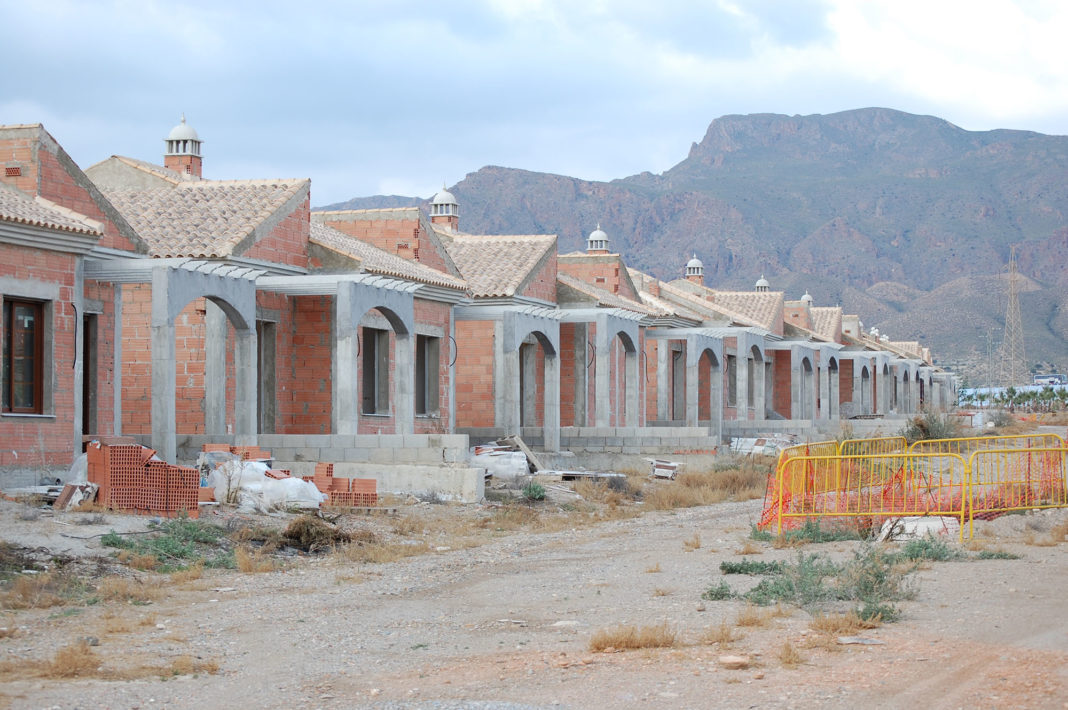- 25th March 2020 – Gerardo Vazquez and translated by Maura Hillen
Faced with the calamity that has fallen upon us with the Coronavirus crisis, it is nice to think of those wonderful years at the beginning of the new century, when it seemed that we were all rich and the money flowed like water.
There was a construction boom and it seemed to matter little if what was built had planning permission or not. “Its fine” some said, others “the Mayor said to build and it will legalised later”, others “Illegal? Nothing is ever demolished here”. In other words, joy and a lack of concern abounded!
But it soon became evident that all that glitters is not gold, and little by little urbanisations began to be frozen. Some by the courts because they lacked permission, others because the subprime crisis came and the promoters were left without money.
As a result of this our nation is littered with the skeletons of urbanisations, wherein lie many broken dreams and a lot of anguish. People invested their savings in a house that would never be built and where the promoter eventually went bankrupt.
This is not the first time that this has happened. Something similar occurred during the construction boom in the 60’s and that is why, wisely, Law 57 was enacted in 1968 regarding the receipt of sums of money prior to the construction and sale of houses.
This law required the guarantee of the repayment of the amounts deposited, plus interest, via a bank guarantee (or insurance policy) issued by an entity inscribed in the Register of Banks, Bankers, and Building Societies, in the event that the construction did not start or was not brought to a successful end for any reason within the agreed time period.

The lawyers, judiciously, soon dusted off this law from the Franco era and claims began to rain down on the banks. Anyone who had a guarantee usually got their money back. But there was not always a bank guarantee. Because the guarantees cost money, more than one promoter said “OK, I will give you a guarantee, but you must pay me for it”. Also, certain requirements had to be met in order to claim against a guarantee, and these requirements were not always met. Existing case law was strictly adhered to.
But in the wake of the bank bailout, things changed. Judges are people and they live in society like everyone else, and most importantly, they read the press. Due to the financial crisis, public opinion was not exactly favourable to the Banks and Building Societies at that time, given that it was clear that there had been malpractice in some cases.
In 2018 and 2019 a series of judgements began to emerge from the Supreme Court that were favourable to the consumer who had deposited money into an account for the purchase of a house on a failed promotion, even if there was no bank guarantee.
As things stand at the moment, if the buyer of a house not delivered in the agreed timeframe, can prove the deposit of funds into a Bank or Building Society, it is well worth thinking about making a claim against the Bank or Building Society, even though the deposit was not the subject of a guarantee.
That’s the good news. The bad news is that action must be taken as soon as possible, because as many know the limitation period changed in 2015 from 15 years to 5 for these cases, respecting the previous period (of 15 years) only until 7th October 2020. This deadline may be extended a little longer because of the State of Emergency due to the Coronavirus, but we will have to see what happens in practice.
To summarise, it is advisable for those who invested in these failed urbanisations to take advice from a specialist lawyer. There is little to lose and a lot to gain, and there are Lawyers who are willing to undertake these claims on terms that are very favourable for the claimant. Get some advice – before the door closes forever.





